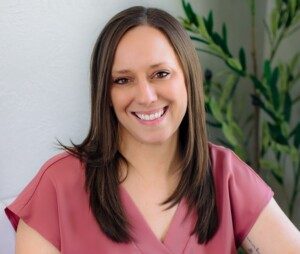So many late diagnosed autistic women have always been fascinated by human behavior and psychology.
Many have made careers out of this, even before getting their autism diagnosis.
“I think even my choice of major in college, in hindsight, screams autism,” begins Cassie Roybal, a late-diagnosed AuDHD licensed professional counselor and founder of EmpowHERed Divergence Therapy.
“I majored in psychology and had always loved learning about human behavior.
“I didn’t even really realize until recently that I spent my whole childhood always studying people and pattern mapping out how interactions went.
“It wasn’t really conscious for me and I just assumed that this was how everyone learned things.
“It wasn’t until I heard from a lot of other late diagnosed autistic people (especially women) that their special interest was studying human behavior that I made the connection that’s what I had been doing.”
If you’ve been noticing that it seems as though a disproportionate number of autistic women are in a profession related to psychology or human behavior – you are not imagining this at all.
It’s pretty easy to find, through an online search, many late diagnosed women who were any of the following prior to coming to the realization that they’re on the Spectrum:
- Psychotherapist
- Psychologist – including specializing in autism assessments
- Mental health counselor
- Social worker
- Direct service provider
However, just because a woman with a late diagnosis of autism isn’t in a line of work related to human behavior doesn’t mean she’s not deeply fascinated by it or has never all her life found psychology intriguing.
I’m a perfect example of this. I’ve never wanted to actually make a living as a mental health specialist.
I was satisfied simply reading up on human behavior and watching countless TV shows over the years related to human psychology – even animal psychology.
I’ve been interested in the way humans think all my life, though I don’t know at what age this began happening.
I do recall, though, having a fascination with human intelligence since around pre-adolescence.
In my late teens I developed a special interest in schizophrenia, and for two summers volunteered at a state mental hospital.
Why So Many Autistic Woman Are Captivated by Psychology
Many autistic women find themselves drawn to psychology, and there are some very interesting reasons for this.
One notable explanation is the deep desire to understand people — both others and themselves.
Autism can come with a sense of social disconnect or difficulty decoding the unwritten rules of human interaction.
This can be summed up succinctly: “I’ve always felt different,” or, “I’ve always felt alien to people.”
It’s the experience of never “getting” their female peers or being able to figure them out.
For many women who have spent years masking or camouflaging their traits to fit in, psychology offers tools to unload and make sense of those complex social dynamics (Lai et al., 2017).
NOTE: Not all “high functioning” autistic women excel at masking. I’m an example.
I could never figure out what to do to be accepted by my classmates at an all-girls Catholic high school during grades 9 and 10.
I didn’t have a playbook. I winged it and it didn’t work. I absolutely just felt so out of place.
Only a few classmates showed a periodic interest in striking up conversation with me.
In addition, I had a friend (not a close friend — never had one of those) whom I jogged with outside of school (we met on the track team). Slept over her house once. Her mother told me, though innocently, that I was “very unusual.”
But I had no problem never seeing the girl again after I moved and completed my education at a different high school.
Psychology also provides a structured way to study emotions, behavior and cognition — areas that may feel unpredictable in daily life.
Autistic women often have intense interests, and for some, understanding the mind becomes a lifelong passion.
This isn’t just about self-reflection; it’s also about seeking clarity and fairness in how people are treated.
Many women on the Spectrum report getting misdiagnosed or being misunderstood by professionals (Hull et al., 2020), so diving into psychology can feel like reclaiming agency.
Growing up, I was never sent to a psychologist for an assessment of any sort.
My behavior was considered odd or weird, different, aloof, unsocial – but still within a normal-enough range that nobody such as teachers ever suggested I undergo any kind of psychological evaluation.
Plus, my parents weren’t strong believers in the field of psychology.
There’s also a practical side of being drawn to the way the human mind works: Autistic women frequently experience anxiety, depression or trauma, often tied to years of masking or going undiagnosed.
Learning about psychological frameworks can be empowering and even therapeutic, helping them navigate their own emotional world with more insight (Bargiela, Steward, & Mandy, 2016).
Finally, psychology often appeals because it gives language to what women with ASD have intuitively sensed but couldn’t always explain.
It bridges gaps between their internal experiences and the external world, helping them not only understand others but feel more understood themselves.
 Cassie Roybal is a late-diagnosed AuDHD therapist (LPC) and founder of EmpowHERed Divergence Therapy, a virtual practice for neurodivergent women in Colorado. Her work is rooted in lived experience, regulation and radical honesty. She’s not here to fix you—she’s here to help you come home to yourself.
Cassie Roybal is a late-diagnosed AuDHD therapist (LPC) and founder of EmpowHERed Divergence Therapy, a virtual practice for neurodivergent women in Colorado. Her work is rooted in lived experience, regulation and radical honesty. She’s not here to fix you—she’s here to help you come home to yourself.
 Lorra Garrick has been covering medical and fitness topics for many years, having written thousands of articles for print magazines and websites, including as a ghostwriter. She’s also a former ACE-certified personal trainer. In 2022 she received a diagnosis of Level 1 Autism Spectrum Disorder.
Lorra Garrick has been covering medical and fitness topics for many years, having written thousands of articles for print magazines and websites, including as a ghostwriter. She’s also a former ACE-certified personal trainer. In 2022 she received a diagnosis of Level 1 Autism Spectrum Disorder.
.



































